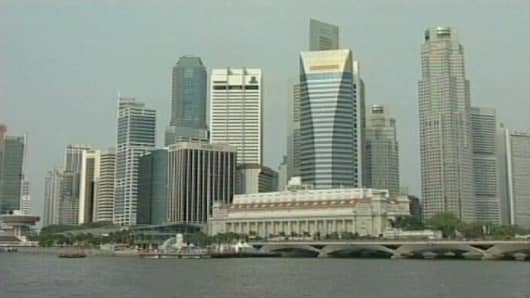The government raised its 2008 inflation forecast to 5-6 percent from 4.5-5.5 percent on Friday, citing high oil and food prices in the near term.
Analysts said rising consumer prices would force the Singapore central bank the Monetary Authority of Singapore (MAS) to let the Singapore dollar, its main policy tool, rise further to tame inflation.
"The pressure will be on to keep the currency strong. The bigger news here is the inflation number. The MAS has been forced finally to raise their inflation forecast range," said Robert
Prior-Wandesforde, a HSBC economist.
Singapore's April inflation accelerated at a faster-than-expected pace of 7.5 percent from a year ago, matching a high reached 26 years ago due to higher housing, food and oil prices.
First-quarter economic growth was below an advance official estimate of a 16.9 percent expansion. A Reuters poll estimated the economy would grow an annualized 15.9 percent in the January-March period.
Singapore's export-driven economy is seen by analysts as a barometer of demand for Asian goods. Exports were worth twice the Southeast Asian nation's S$229 billion ($169 billion) economy last year.
From a year earlier, the city-state's economy expanded 6.7 percent in the first quarter, compared with an advance estimate of 7.2 percent. The Reuters poll forecast growth of 7 percent.
Manufacturing expanded 12.4 percent in the first quarter from a year earlier, while construction grew 14.7 percent. The financial services sector grew 13.4 percent.
Economies across Asia are expected to slow this year as a stumbling U.S. economy cuts demand for the continent's exports, a key driver of growth, but evidence of a slowdown has been mixed so far.
Growth in Japan, China and Hong Kong were surprisingly resilient in the first quarter, although South Korea's economy grew at its slowest quarterly pace in more than three years in the
January-March period.
The government reiterated on Friday that the Singapore economy is expected to grow between 4-6 percent this year, well below an average growth rate of 8.1 percent in the last four years.
Analysts said the economy's surprisingly strong growth in the first quarter gave Singapore's central bank room to tighten monetary policy in April by allowing the Singapore dollar to rise
further.
However, some economists said the strength of the Singapore dollar would crimp exports growth at a time when demand in the key U.S. and European markets are weakening.
United States and Europe buy about a third of Singapore's non-oil domestic exports.
Singapore's growth is largely fuelled by manufacturing of goods such as electronics, drugs and oil rigs. However, the economy is leaning more on other sectors such as tourism, financial services and construction to underpin growth.


